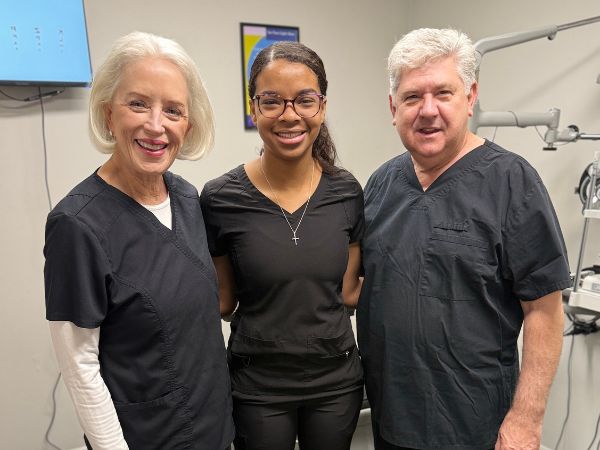Through the collaboration of Malia McDowell, Class of 2026, and dedicated UAB School of Optometry alumni, a vital new service was launched and sustained at the Community of Hope Health Clinic (CHHC). CHHC stands as a beacon of care for residents of Shelby County who live at or below 200% of the Federal Poverty Guidelines and lack access to insurance. In the summer of 2024, the clinic expanded its offerings to include optometric care, providing fully dilated eye exams to individuals in need.
The involvement of Doug Clark, OD, Class of 1982, as a board member led to the clinic offering free eye care services. He has served the nonprofit for eight years, but budget constraints delayed the addition of eye care at the comprehensive care clinic.
“With the donations of some equipment and the purchases of other equipment, it was destined that we incorporate optometry as one of the services we provide for free at the Community of Hope Health Clinic,” said Justin Johnston, executive director.
Once the service was launched, Catherine Amos, OD, a 1974 graduate, joined Clark as a weekly volunteer. Both retired, he and Amos are longtime friends and colleagues.
Their most significant impact is managing patients with diabetes. “Three-fourths of our patients are diabetics,” Clark said. “For many of these patients, we are providing them with their first eye examination.”
Patients requiring additional tests or treatments are referred to providers who can preserve or restore their vision, enabling them to continue caring for their families and be active members of their communities.
“Between our weekly optometry clinics and the Community Eye Care clinic we had with the School of Optometry in November, our patients are receiving services they normally would not have access to receive,” Johnston said.
This new service became the foundation for a meaningful project led by McDowell, an optometry student and a 2024 Albert Sweitzer Foundation of Alabama Fellow (ASF). Inspired by a deep-rooted commitment to service and a mentor who embodies that same spirit, the project became a personal calling that furthered her passion for serving those in need.
“I chose my project because of Dr. Janene Sims,” McDowell said. “She’s the Service Director for Community Eye Care and has been my role model throughout optometry school. Her heart for service and ability to bring people together for a cause is unmatched. She encouraged me to pursue my fellowship at CHHC, and her guidance was the reason my project was successful.”
Janene Sims, OD, PhD, is also an associate professor at the school. Because of her support, McDowell nominated Sims for ASF’s Outstanding Mentor award, which Sims won.
Clark and Amos served as attendings when McDowell worked onsite. She grew as an optometry student with their guidance.
“Shadowing Dr. Clark and Dr. Amos was transformative,” McDowell said. “They not only improved my clinical skills but also showed me what it means to serve with compassion. They trusted me to grow, eventually allowing me to perform full eye exams under their supervision.”
The lessons learned during the fellowship extended far beyond clinical skills.
“Knowledge is power, but compassion is action,” McDowell said. “As healthcare providers, we must be ready to help beyond the exam chair. Whether it’s domestic violence, food insecurity, or lack of shelter, we need to know where to turn and how to help. This fellowship gave me the confidence to ask the right questions and connect patients with real solutions.”
The results of her ASF initiative were tangible and far-reaching, providing a lasting impact.
“She has not only participated in patient care but also helped in organizational incorporation of optometric care into the entire clinic,” Clark said. “Her energy and enthusiasm were inspirational.”
Through her project, the clinic received free glasses and sunglasses from VSP’s Eyes of Hope. Patients received custom and over-the-counter readers, plus the clinic was left with a 21-page manual that standardizes optometric care at CHHC.
Looking ahead, McDowell plans to carry lessons learned into a future optometric career rooted in service.
“I’ll always ask more than just, ‘Can you see clearly?’ I’ll ask, ‘Are you okay? Do you have what you need?’ Because that’s what it means to truly care.”
